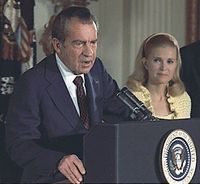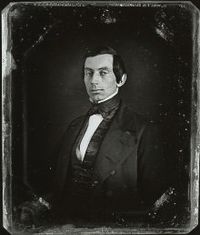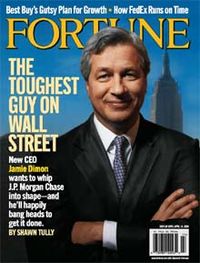Think of this as Volume 14, Number 27 of A-Clue.com, the online newsletter I've written since 1997. Enjoy.
One of the recurring patterns of our political history is that the weapons of the previous antithesis must be relied upon to push forward a new thesis, even though the thesis and antithesis have no relation to one another.
- Lincoln was a Whig. He was a great admirer of Henry Clay, the Great Compromiser. Yet his thesis, of union, seemed to be the opposite of what Clay stood for.
- Teddy Roosevelt was a Mugwump. The Mugwumps were "big chiefs," influential and powerful men, who coalesced around Grover Cleveland to fight the corruption of the 1880s. His chief opponents were always other Republicans.
- Franklin Roosevelt identified with Wilsonism. Wilson combined Bryan's populism with an aggressive foreign policy, all supposedly in the name of principle.
- Nixon was Eisenhower's vice president. Eisenhower was the antithesis to the New Deal, accepting its premises but promising a kinder, gentler, more business-friendly version.

Bill Clinton's Third Way was the Democrats' antithesis to Nixonism, to its thesis of conflict. Clinton leaned against conservatism, compromised with it, giving it some of its greatest victories while getting no credit from the right at all, then or now.
Why is this the way? It's because Washington can only hold two vocabularies within it at any one time. It's either this or it's that. It's either conservatives or Clintonism. Just as, a generation ago, it was either liberals or Nixonism.
Barack Obama feeds his base rhetoric while backing-and-filling against what seems, from Washington, to be a rising conservative tide. The fact that the tide is not rising, that it's falling, is not the point.
And it is falling. Because as a thesis ages, as myths, values, and assumptions step further and further from their own time of creation, they become increasingly irrelevant, even crazy:
- How does Hooverism solve the problems of the Great Recession when it failed 80 years ago?
- How does being nice to Wall Street or BP keep the same disasters from happening again?
- How does emulating Osama bin Laden's social views provide the contrast needed to defeat religious extremism?
At its heart, every great crisis in American history has been a test of our will. We have been faced with the voices of people who said that the union could not be preserved, that capitalism and society were on a collision course, that the center could not hold, that society would be torn apart by drugs and rock music.

In the case of our current troubles, we need to understand that we are one people, one nation, that we're all in this together. Government isn't them, it's us. Not everyone is corrupt, and an informed citizenry can ferret out those who are. We still have the best educated workforce in the world, the most efficient bureaucracies, the most money and natural resources. We just need to get them working in the same direction.
The Nixon Thesis of Conflict is also an attitude. But as we're seeing right now it can also lead to madness. It separates America into two camps, the good, god-fearing decent people and the Dirty Fucking Hippies. But the Democratic Party never was a bunch of hippies, and it isn't now. It's just another bunch of Americans with different backgrounds from yours who have different views.

They need to pay a political price for that, and I believe Washington will be shocked that they do pay a price. Political madness has never paid with a majority of Americans. Righteous anger over our problems, yes. But not madness that sets brother-against-brother, farm-against-city, rich against poor, or father-against-son.
Despite the hatred expressed on the Right, toward the President, toward Democrats, or even on this blog, understand that it's a natural extension of political beliefs they have followed, successfully, for a generation. You plot a course early in your lifetime, and seldom change until it has led you over a cliff.
Our country has now fallen over that cliff. We need a new course. A different course. One that begins with the need for consensus. It's what Bill Clinton turned into compromise, as Henry Clay did, and it's a consensus that can only be won when some ideas are pushed out of our political tent entirely, rendered anathema by events.
That's what is happening right now. The oil spill shows we can't expect anyone to police themselves — we need cops in the suites as we do on the streets. It's not Obama's Katrina. It's oil's.
In time, with wisdom and sacrifice, Americans will learn this lesson. Or they will lose their union.












Great post. Here’s an idea, as situations get older, while wrastling with the same old problems we take in the good parts of previous solutions, they become part of the baseline, which means a good leader will incorporate the best of the previous.
And thank you for mentioning my Party, the DFH! Go Woodstock! Particularly apt on our Birthday!
Happy Fourth
Great post. Here’s an idea, as situations get older, while wrastling with the same old problems we take in the good parts of previous solutions, they become part of the baseline, which means a good leader will incorporate the best of the previous.
And thank you for mentioning my Party, the DFH! Go Woodstock! Particularly apt on our Birthday!
Happy Fourth
It’s quite difficult to summon courage when the people feel the system is rigged against them, that business interests have long bought every politician, written every policy for them to vote for, every judge, all the big media, and quite a few educational institutions in this land. We may think we have a choice, but whether it’s Wall Street “reform,” healthcare “reform,” or war funding, we didn’t get a vote, but big PhRMa sure did. Goldman Sachs sure did. And Lockheed Martin sure did.
It’s particularly troubling to see our President continue to vacation and play golf (can’t this crap wait until he’s out of office?) while more people are out of work today than since the ’30s. His actions may seem trivial, but they are symbolic of a millionaire who’s gotten his and has no urgency to help others — ask the Hispanic community how much work he’s done to keep his promise on immigration reform, for example.
We know the conservatives are truly nuts, as in you can’t even talk to these people anymore because they haven’t made sense in decades. (Obama did say that “In the ’90s, the good ideas came out from the Republicans.” Meanwhile, Obama himself has YET to provide a long-term strategy for energy independence, nor any honest plan to end two wars. By the time Congress finishes its various vacations for the year, we’ll be two years into this presidency and he’s YET to lay out an energy strategy for the country’s future.
I have solutions, but what I don’t have is $650mn to run for president. I could delay playing golf and reserve vacations for after I leave office. Let’s at least start by asking Obama to end two purposeless wars. If he won’t even visit that task, then he was never a Democrat at all.
It’s quite difficult to summon courage when the people feel the system is rigged against them, that business interests have long bought every politician, written every policy for them to vote for, every judge, all the big media, and quite a few educational institutions in this land. We may think we have a choice, but whether it’s Wall Street “reform,” healthcare “reform,” or war funding, we didn’t get a vote, but big PhRMa sure did. Goldman Sachs sure did. And Lockheed Martin sure did.
It’s particularly troubling to see our President continue to vacation and play golf (can’t this crap wait until he’s out of office?) while more people are out of work today than since the ’30s. His actions may seem trivial, but they are symbolic of a millionaire who’s gotten his and has no urgency to help others — ask the Hispanic community how much work he’s done to keep his promise on immigration reform, for example.
We know the conservatives are truly nuts, as in you can’t even talk to these people anymore because they haven’t made sense in decades. (Obama did say that “In the ’90s, the good ideas came out from the Republicans.” Meanwhile, Obama himself has YET to provide a long-term strategy for energy independence, nor any honest plan to end two wars. By the time Congress finishes its various vacations for the year, we’ll be two years into this presidency and he’s YET to lay out an energy strategy for the country’s future.
I have solutions, but what I don’t have is $650mn to run for president. I could delay playing golf and reserve vacations for after I leave office. Let’s at least start by asking Obama to end two purposeless wars. If he won’t even visit that task, then he was never a Democrat at all.
this is what I’m looking for this kind of information… investment in Bristol
this is what I’m looking for this kind of information… investment in Bristol
What? A Dana blog where he doesn’t blame something on Bush? There is still hope, even for baby-murder-approving socialists…
What? A Dana blog where he doesn’t blame something on Bush? There is still hope, even for baby-murder-approving socialists…
This is real blogging instead of the same old simplistic Republican=Satan, Liberal=God Dana blogs
http://spectator.org/archives/2010/07/16/americas-ruling-class-and-the/print
This is real blogging instead of the same old simplistic Republican=Satan, Liberal=God Dana blogs
http://spectator.org/archives/2010/07/16/americas-ruling-class-and-the/print
I love Franklin Roosevelt. Thanks for sharing such valuable informations here.
I love Franklin Roosevelt. Thanks for sharing such valuable informations here.
HA HA! The way you described the Presidents is very hilarious. I did laugh at each description. So much for my hectic day. I am now smiling.
HA HA! The way you described the Presidents is very hilarious. I did laugh at each description. So much for my hectic day. I am now smiling.
WElcome for year 2011
WElcome for year 2011
Not everyone is corrupt, and an informed citizenry can ferret out those who are. Thanks
Not everyone is corrupt, and an informed citizenry can ferret out those who are. Thanks
An Armed Militia (etc.) is what’s needed for the citizens to defend themselves against the socialization that’s taking place by foreigners like Hussein HopenChange and his militant pro-feminist – pro-murder-babies staff.
But we of course rely on good ol’ democracy to turn things right. The American people, seeing that Hussein HopenChange delivered just the opposite of what they wanted, voted the dems home in November. Next round we’ll clear the white house of foreigners and get some sanity back again. No more baby murdering, no more hate speeches, no more socialization, no more tax hikes for people who actually produce wealth, no more thefts of property. Yep. Life’s looking good. Except of course when you actually believed in Hussein HopenChange.
An Armed Militia (etc.) is what’s needed for the citizens to defend themselves against the socialization that’s taking place by foreigners like Hussein HopenChange and his militant pro-feminist – pro-murder-babies staff.
But we of course rely on good ol’ democracy to turn things right. The American people, seeing that Hussein HopenChange delivered just the opposite of what they wanted, voted the dems home in November. Next round we’ll clear the white house of foreigners and get some sanity back again. No more baby murdering, no more hate speeches, no more socialization, no more tax hikes for people who actually produce wealth, no more thefts of property. Yep. Life’s looking good. Except of course when you actually believed in Hussein HopenChange.
I’m a blogger myself and I found your post is very interesting and informative so I have decided to drop a comment. Good job on the post, and I’ve just became subscribed to your blog. Hope you do the same for me. Feel free to visit and comment on my blog as well!
Johnny
I’m a blogger myself and I found your post is very interesting and informative so I have decided to drop a comment. Good job on the post, and I’ve just became subscribed to your blog. Hope you do the same for me. Feel free to visit and comment on my blog as well!
Johnny
Very informative information are here. Good stuff. Fantastic work. Thank you share this info with public.
Very informative information are here. Good stuff. Fantastic work. Thank you share this info with public.
Ha! They’re all spam – linking to mattresses and massages and web hosting – but I bet you Dana sits there smiling and reading them like they’re real people commenting.
Ha! They’re all spam – linking to mattresses and massages and web hosting – but I bet you Dana sits there smiling and reading them like they’re real people commenting.
What about OBAMA????
What about OBAMA????
Obama is a crisis leader, because we’re in an economic crisis caused by an artificial scarcity.
That’s just where he is on the historical map. Nixon was in a similar place. So was Lincoln. So were McKinley and FDR.
An economic crisis offers leaders an opportunity to change political assumptions for a generation. This is made clear by events. Nixon and Kent State. Obama and Osama. Assumptions change as a result of such things.
As always, your mileage will vary. History hasn’t been written. It’s rewritten every day. But America in the past has been lucky. Our crisis leaders have gotten us through.
Obama is a crisis leader, because we’re in an economic crisis caused by an artificial scarcity.
That’s just where he is on the historical map. Nixon was in a similar place. So was Lincoln. So were McKinley and FDR.
An economic crisis offers leaders an opportunity to change political assumptions for a generation. This is made clear by events. Nixon and Kent State. Obama and Osama. Assumptions change as a result of such things.
As always, your mileage will vary. History hasn’t been written. It’s rewritten every day. But America in the past has been lucky. Our crisis leaders have gotten us through.
With all due respect, I’m not aware of what Nixon “got us through”. I wasn’t really there, but my understanding is that Nixon was the beneficiary of a split between the near left and far left, and that part of the fallout of Kent State was an actual softening of the generation wars. As someone else put it, parents didn’t like what their kids were doing, but they generally didn’t think it deserved the death penalty (despite a few things I’ve read).
For my part, I’ve always been about healing the split on the left before moving toward a larger consensus. And if I say so myself, it seems like the DFHs have been more willing to reach out to heal that split, while the centrist wing of the Dems seems to prefer reaching out to the GOP.
With all due respect, I’m not aware of what Nixon “got us through”. I wasn’t really there, but my understanding is that Nixon was the beneficiary of a split between the near left and far left, and that part of the fallout of Kent State was an actual softening of the generation wars. As someone else put it, parents didn’t like what their kids were doing, but they generally didn’t think it deserved the death penalty (despite a few things I’ve read).
For my part, I’ve always been about healing the split on the left before moving toward a larger consensus. And if I say so myself, it seems like the DFHs have been more willing to reach out to heal that split, while the centrist wing of the Dems seems to prefer reaching out to the GOP.
Jeff: Thanks for writing, and for your thoughtful response to what I wrote.
In saying that Nixon “got us through,” I’m not endorsing what he said or did. I’m repeating history’s judgement.
The assumptions Nixon represented — what I call his core Thesis — were about a new economy built on what California brought (technology and intellectual property), a media mix built around TV, and political organization built through cash contributions.
Politics still seems to work that way. We assume the economy does, too. And the media.
But all that came apart under GW Bush, who was neither stupid nor an aberration. Why, and what replaces it, is the subject of my political posts here.
Thanks again.
Jeff: Thanks for writing, and for your thoughtful response to what I wrote.
In saying that Nixon “got us through,” I’m not endorsing what he said or did. I’m repeating history’s judgement.
The assumptions Nixon represented — what I call his core Thesis — were about a new economy built on what California brought (technology and intellectual property), a media mix built around TV, and political organization built through cash contributions.
Politics still seems to work that way. We assume the economy does, too. And the media.
But all that came apart under GW Bush, who was neither stupid nor an aberration. Why, and what replaces it, is the subject of my political posts here.
Thanks again.